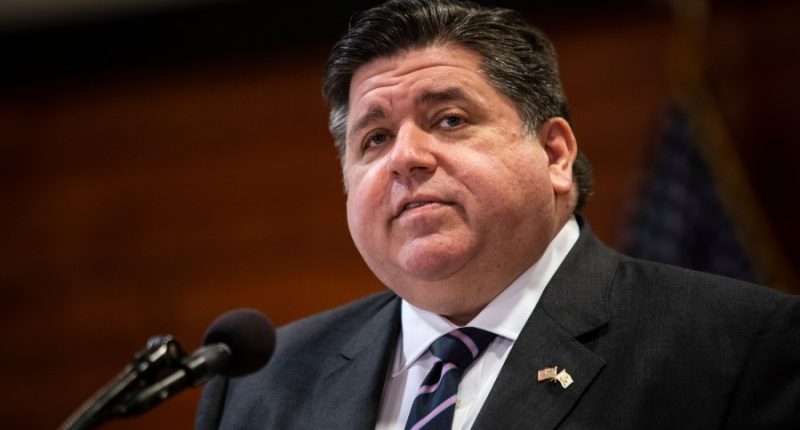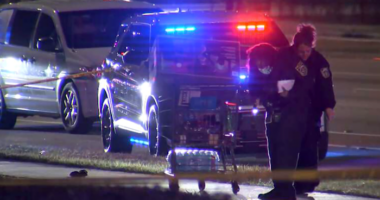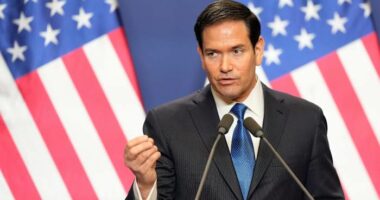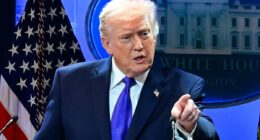Share this @internewscast.com

SPRINGFIELD, Ill. (NEXSTAR) — Governor Pritzker drew a line in the sand Wednesday, as lawmakers scramble to pass a budget before the end of May.
He said he would veto any budget that included broad tax increases, echoing similar sentiments from his February budget proposal.
“I’ve been opposed to any taxes that are broad based or that would affect working families in this budget,” Pritzker said.
Pritzker specifically pointed to increases in the income tax, sales tax and the creation of a service tax as initiatives he would not support.
If those options are genuinely unavailable, it’s uncertain what alternatives lawmakers might consider beyond reducing agency budgets. With just three days remaining in May, a budget has yet to be disclosed. This year’s negotiations rank among the most challenging the state has faced in recent memory.
In an interview last week on Capitol Connection, lead Senate Budgeteer Elgie Sims would not say whether or not the Senate Democratic caucus was considering tax increases or not.
House Democrats were polled on their receptiveness to a wide array of potential tax increases to potentially help balance the budget, but none have been officially proposed.
Republicans have already started to criticize and draw attention to potential tax increases. They tried to build up public opposition to tax increases, as well.
“Illinois is facing $1 billion budget deficit,” Rep. Ryan Spain (R-Peoria) said. “Why is that? It’s because our state has not been growing for year after year after year. And we certainly aren’t keeping pace of other states in the Midwest to facilitate economic growth.”
Pritzker’s comments Wednesday sets his intentions clear for this budget. When asked if he believes Senate President Don Harmon and House Speaker Chris Welch shared in his opinion, Pritzker didn’t speculate.
“I’ve been pretty clear with everybody that, you know, individual income taxes, corporate income taxes, sales taxes,” Pritzker said. “We are not about raising those taxes at all. I would veto a bill that does that.”
Lawmakers have known since November they would be dealing with a deficit for the coming fiscal year. Despite using optimistic revenue projections, Pritzker proposed a relatively austere budget in February that included no tax increases, flat spending, and cuts to a program giving non-citizens between the ages of 42 and 64 access to state sponsored healthcare. His budget did however, still increase spending from last year.
Since then, revenue projections came in $500 million short of Pritzker’s projection, and the state is also facing the threat of cuts from the federal government and the Trump administrations attempts to downsize government.
“The Trump White House has not made our job easy,” Sims said.
The state has already been impacted by tons of cuts, including those from the Department of Government Efficiency. Recent negotiations in Congress over a spending plan of their own could lead to huge cuts to Medicaid, SNAP Food Assistance Programs and Clean Energy incentives the state has been benefitting from. However, Congress has yet to settle on a plan, so state lawmakers can’t settle on a clear way to react. The uncertainty has led to some conversations about lawmakers returning later in the summer to adjust their spending plans.
“Whatever the uncertainty that happens coming out of Washington will respond in kind,” Sims said. “So if we’ve got to come back, we will. But by May 31st, our plan is to pass a budget that that funds our reality, a reality for the fiscal year, funds our priorities for the fiscal year.”
Republicans downplayed those ideas, though, due to certain provisions not taking effect immediately.
“I think that’s pretty silly, considering nothing will be effective immediately. We’ll have a lot of time to adjust and adopt,” Spain said.
Lawmakers have until May 31st to pass the budget, or else the vote threshold needed to pass both chambers goes from a simple majority to a three-fifths majority. Democrats hold supermajorities in both chambers, so they could still pass a budget without Republican support if they go past the May 31st deadline.










